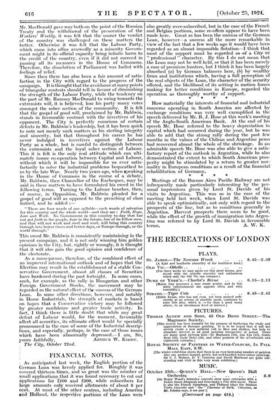FINANCIAL NOTES.
As anticipated last week, the English portion of the German Loan was keenly applied for. Roughly it was Covered thirteen times, and so great was the number of Small applications that it was found necessary to cut out applications for 1100 and £200, while subscribers for large amounts only received allotments of about 6 per Cent. At most of the other centres, including America and Holland. the respective portions of the Loan were also greatly over-subscribed, but in the case of :the French and Belgian -portions, some re-offers-appear tb have been made here. Great as has been the success of the German Loan, however—a success all the more remarkable in view of the fact that a few weeks ago it would'have been regarded as an almost impossible flotation—I think that most of the support must be, regarded as-of a Citty--tii " professional " charaCter. By this I do not mean that the Loan may not be well held, or that it has been merely a case of premium hunters, but I think it has been largely absorbed (a) by German balances here, (b) by wealthy firms and institutions which, having a full perception of the real objects of the Loan, the character of the security offered, and the likelihood of its setting in motion forces making for better conditions in Europe, regarded the operation as thoroughly worthy of support. * * How materially the interests of financial and industrial concerns operating in South America are affected by exchange conditions was very well exemplified in the speech delivered by Mr. R. J. Hose at this week's meeting of the Anglo-South American Bank. At the end of his speech Mr. Hose referred to the heavy depreciation in capital which had occurred during the year, but he was able to add that the strong rally during the past few months in the values of the Chilean and Argentine pesos had recovered almost the whole of the shrinkage. In an admirable speech Mr. Hose was also able to give a satis- factory report of the outlook in Argentina while he also demonstrated the extent to which South Argentina, pros- Perky might be stimulated by a return to greater nor- mality in European conditions as a result of the financial' rehabilitation of Germany.
Meetings of the Buenos Aires Pacific Railway are not infrequently made particularly interesting by the per- sonal impressions given by Lord St. Davids of his visits to Argentina. This was so in the case of the meeting held last week, when Lord St. Davids was able to speak optimistically, not only with regard to the prospects of the line, but as to conditions generally in Argentina. Harvest prospects there seem to be good, while the effect of the growth of immigration into Argen- tina was referred to by Lord St. Davids in favourable


























































 Previous page
Previous page